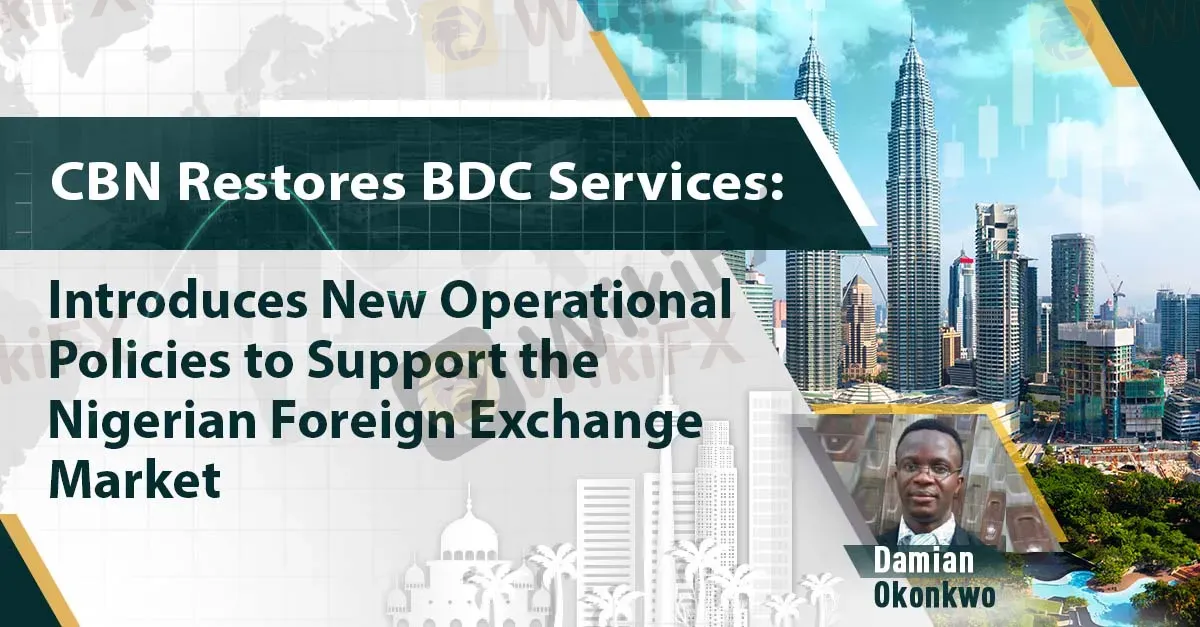简体中文
繁體中文
English
Pусский
日本語
ภาษาไทย
Tiếng Việt
Bahasa Indonesia
Español
हिन्दी
Filippiiniläinen
Français
Deutsch
Português
Türkçe
한국어
العربية
CBN Restores BDC Services: Introduces New Operational Policies
Abstract:The Central Bank of Nigeria (CBN) has restored the services of Bureau De Change (BDC) operators in the country, two years after suspending them.

By: Damian Okonkwo

The Central Bank of Nigeria (CBN) has restored the services of Bureau De Change (BDC) operators in the country, two years after suspending them. The apex bank also announced a new set of operational guidelines for BDCs, aimed at improving transparency and efficiency in the foreign exchange market.
Under the new guidelines, the spread between the buying and selling prices of foreign exchange by BDCs will be limited to 2.5%. This is in contrast to the previous policy, which allowed BDCs to charge a spread of up to 5%.
The CBN also said that BDCs will now be required to render daily, weekly, monthly, quarterly, and yearly reports on their foreign exchange transactions. This is aimed at helping the CBN to better monitor the activities of BDCs and to ensure that they are complying with the new guidelines.
The CBN's decision to restore BDC services is a major policy shift. The apex bank suspended BDCs in 2021, citing concerns about illegal activities in the BDC segment of the foreign exchange market. However, the CBN has said that the new guidelines will help to address these concerns and to create a more transparent and efficient foreign exchange market.
The restoration of BDC services is expected to help to improve the availability of foreign exchange in Nigeria. BDCs are a major source of foreign exchange for businesses and individuals, and their return to the market is likely to lead to a decrease in the black market premium for foreign exchange.
The CBN's new operational guidelines for BDCs are also a positive development. The stricter regulations are likely to deter illegal activities in the BDC segment of the foreign exchange market and to promote transparency.
Additionally, the CBN further introduced a new foreign exchange price verification system (PVS) portal. This portal will be used to verify the prices of foreign exchange quoted by BDCs and other market participants.
Overall, the CBN's decision to restore BDC services and to introduce new operational guidelines is a positive step towards improving the foreign exchange market in Nigeria. The new policies are likely to lead to a more transparent and efficient market, which will benefit businesses and individuals alike.

Disclaimer:
The views in this article only represent the author's personal views, and do not constitute investment advice on this platform. This platform does not guarantee the accuracy, completeness and timeliness of the information in the article, and will not be liable for any loss caused by the use of or reliance on the information in the article.
Read more

‘Metherworld is the future’ Under Questions from Traders: Is it a Safe Bet?
Mether World, an unregulated broker claiming to be the future of trading and Web3 education, has come under scrutiny due to its lack of reliability and concerns from traders. Others are advised to choose other regulated alternatives over such platforms.

Gold Prices Rise After U.S.-China Tariff Deal and Lower Inflation
Gold prices climb to $3,246.95 after U.S.-China tariff truce and soft CPI data. Traders eye Fed rate cuts and trade talks for gold's next move. Insights for daily trading.

RM80 Million in Losses After ‘Islamic’ Scheme Falls Apart
A group of 232 investors is urging Malaysian authorities to launch a comprehensive investigation into an Islamic investment scheme that reportedly incurred losses exceeding RM80 million. The scheme, marketed under the guise of Islamic Redeemable Preference Shares (IRPS), is now under scrutiny for alleged misrepresentation and regulatory breaches.

Forex or Crypto? A Clearer Look at Two Popular Trading Choices
As financial markets grow and change, two trading areas have gained strong attention: foreign exchange (forex) and cryptocurrency. How do you know which one might be a better fit for your investment goals? Read this article to find out!
WikiFX Broker
Latest News
Short-Term Pressure Mounts on Gold as Risk Sentiment Improves
How Will the U.S.-China Trade Deal Affect the Dollar and Global Markets?
Radiant DAO Proposes Compensation Plan for Wallet Losses
BitGo Secures MiCA License, Expands Crypto Services Across the EU
FBI Calls on AML Bitcoin Scam Victims to File Claims by June 5
US Dollar Index Makes a Strong Comeback, Climbs Back to 101.60 Level
Big Changes at Saxo Bank: What Traders and Partners Need to Know
Traders Warned to Stay Alert Amid Growing Exposures for INGOT Brokers
WELTRADE's transformation from Reliable to a Problematic Broker
How UK-China Financial Cooperation Is Shaping Global Resilience
Currency Calculator


